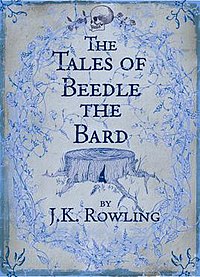The
Tales of Beedle the Bard
is the collection of fairy tales mentioned in Harry Potter and the Deathly Hallows; the seventh and last novel in
the Harry Potter series. The whole work is a spin-off book written by J.K.
Rowling and first published in 2007. Other spin-offs like this one are, for
instance, Quidditch Through the Ages
and Fantastic Beasts and where to Find
Them. I started reading this book immediately after having finished the
seventh book in the Harry Potter series (as I for some reason never thought of
reading them as a child, I decided to finally do so now). Without spoiling
anything, I will be going through what I liked and did not like about this
collection.
Just
the fact that Rowling took her time to write this book amazes me. These
additional books make the reader even more involved in the Harry Potter universe.
The foreword, footnotes and afterword (by none other than Albus Dumbledore
himself) are extremely witty. Sometimes Dumbledore makes reference to events
that occurred in the Harry Potter series, making the reader feel even more
connected to Hogwarts and its history. Thus the book itself contributed to the
authenticity of the world and the involvement of the reader.
The
audience is not necessarily limited, either. While having read all of the Harry
Potter books will make the experience even better, it is not a necessity for
enjoying the fairy tales. If you have children, you might even consider reading
them this book before reading the first one in the actual series. That way,
when you reach the last novel, your children will recognize the fairy tale,
which could be exciting for them. Except for the occasional references to
magical terms, there really is no reason why anyone cannot read these fairy
tales.
The
language is very clear and simple. This has two effects: the authenticity of
the spin-off (as it is supposed be a
collection of children’s tales) and the possibility to read it aloud for
children. Because the book found in the Harry Potter series is meant for
children, this one is, too. All the fairy tales follow the pattern that fairy
tales and fables often do, with morals like: do not try to trick death, tell
the truth, help others who are in need, etc. As “normal” fairy tales (or should
I say “Muggle fairy tales”?) often include magic, there really is not much
difference between the famous Grimm’s
Fairy Tales and The Tales of Beedle
the Bard.
The
pace of the stories is perfect for fairy tales. There is usually an
introduction, with the exposition and the everyday life of the protagonist,
followed immediately by the problem. Like in tragedies, the characters’ faults
are usually what catch up to them in the end, creating a tragic irony in the
tales. I always enjoyed fairy tales as a child and could not stop reading until
I had finished the book (though it is not that long).
As a spin-off, the book is extremely well made. It
fits perfectly with the Harry Potter universe and is definitely recommended for
both those who are and those who are not fans of the Harry Potter series. Of
course, the book will be most enjoyable if one has read all of the books, as
one will know more about the circumstances around the book and how it was used
by Harry and his friends.
I give this collection of fairy tales 5/5, as it is
the perfect spin-off book. I recommend it to everyone.
- Charlie.







